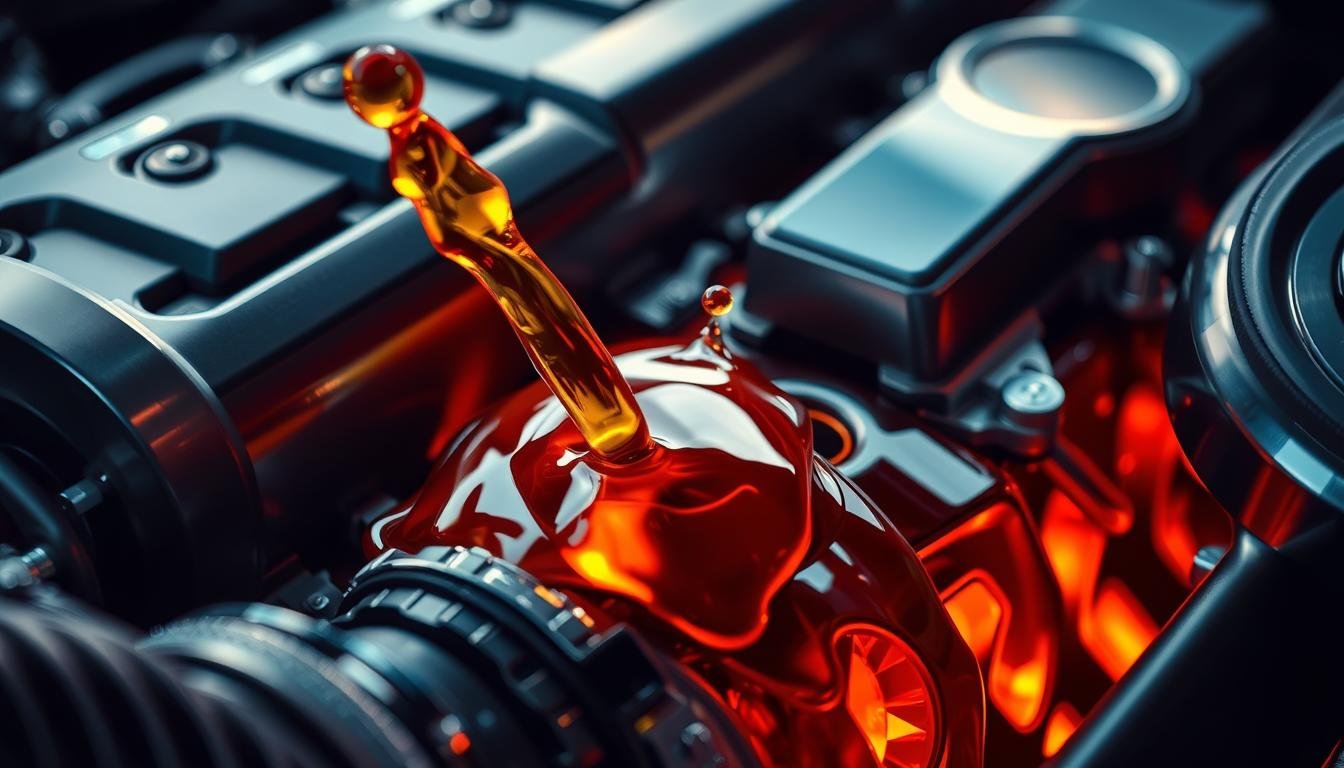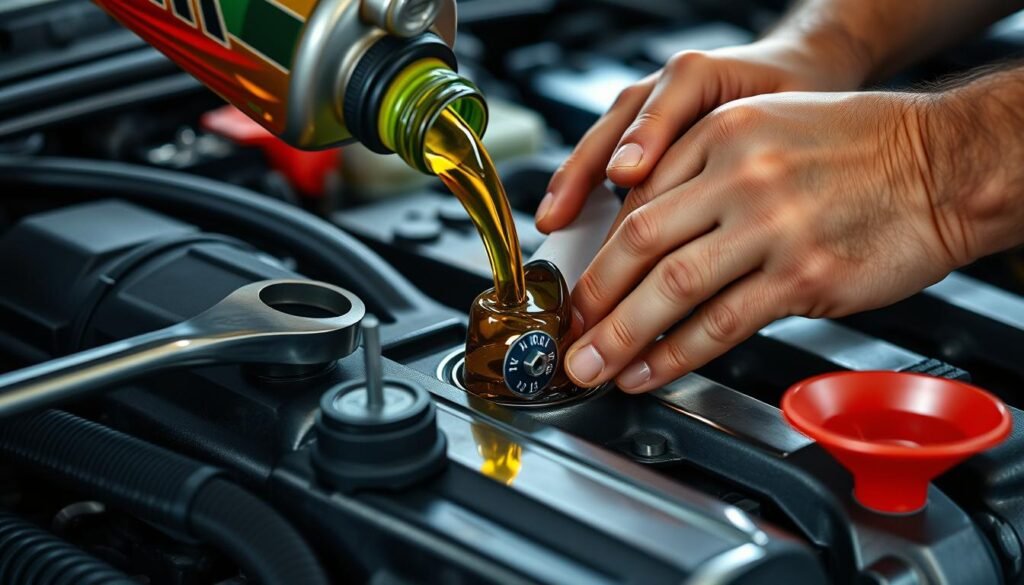Have you ever felt your car shaking while driving? It might be a sign of low engine oil. Can low oil cause a car to shake? Let’s find out. We’ll explore how oil levels affect your engine, the signs of low oil, and how to keep your car running smoothly.
Key Takeaways
- Insufficient engine oil can lead to increased friction and vibrations, causing your car to shake.
- Low oil levels can damage critical engine components like bearings, leading to further problems.
- Recognizing the signs of low oil, such as unusual noises or shaking, is crucial for timely maintenance.
- Regularly checking and maintaining proper oil levels is essential to prevent car shaking and engine damage.
- Seeking professional help when experiencing persistent car shaking can help diagnose and address the underlying issue.
Understanding Why Cars Shake Due to Low Oil
At the heart of your vehicle’s performance lies the engine oil. It’s a vital component that ensures smooth and efficient operation. When it comes to oil level check and engine oil maintenance, understanding the role of engine oil is crucial. Insufficient oil levels can lead to a series of problems, including the dreaded car shaking, which can severely impact your automotive repair needs.
The Role of Engine Oil in Vehicle Performance
Engine oil is like the lifeblood of your vehicle. It lubricates critical components and reduces friction within the engine. It helps dissipate heat, prevents wear and tear, and ensures the smooth operation of moving parts. When the oil level drops below the recommended threshold, the engine struggles to function optimally, leading to various issues, including the shaking of the vehicle.
How Oil Deficiency Leads to Vibrations
As the oil level decreases, the engine components begin to operate with increased friction. This generates heat and causes vibrations. Without enough lubrication, metal-on-metal contact between moving parts occurs, resulting in a noticeable shaking or trembling sensation in the vehicle.
Impact on Engine Components
- Bearing Damage: Insufficient oil can cause significant damage to engine bearings, leading to increased wear and tear, and even potential failure.
- Cylinder Wall Scoring: Without adequate lubrication, the pistons and cylinder walls can experience scoring, further exacerbating the shaking and vibration issues.
- Timing Chain Problems: Low oil levels can cause timing chain issues, affecting the synchronization of the engine’s components and contributing to the overall shaking.
Addressing oil level check and maintaining proper engine oil maintenance is crucial. It prevents these problems and ensures your vehicle’s smooth and reliable performance. Regular inspections and prompt attention to any signs of low oil can go a long way in avoiding costly automotive repair down the line.
Common Signs Your Car is Shaking from Low Oil
Finding out why your car shakes can be tough. But, there are clear signs that low oil might be the cause. Knowing these signs helps you fix the problem early and avoid bigger issues.
The oil pressure warning light on your dashboard is a clear sign. It tells you your oil levels are too low. Ignoring this light can harm your engine badly.
You might also hear a ticking or knocking sound from your engine. This noise happens because parts wear out faster without enough oil.
- Unexplained vibrations or shuddering while the engine is running
- Difficulty in steering or loss of power steering assistance
- Unusual engine noises, such as knocking, ticking, or grinding sounds
- Reduced fuel efficiency or a noticeable drop in engine performance
If your car shows these signs, you need to act fast. Not fixing these problems can cause serious engine damage. This can be dangerous and expensive to fix.
| Symptom | Potential Cause | Recommended Action |
|---|---|---|
| Oil pressure warning light | Low oil level or pressure | Check oil level and top up if necessary |
| Engine noise (ticking, knocking, grinding) | Increased friction due to low oil | Check oil level and change oil if required |
| Vibrations or shuddering | Uneven engine operation due to low oil | Check oil level and address any underlying issues |
| Reduced fuel efficiency | Increased engine friction from low oil | Check oil level and change oil if necessary |
By watching for these signs and acting quickly, you can protect your car. This keeps your car running smoothly and safely.
Can Low Oil Cause Car to Shake? The Direct Connection
Keeping an eye on engine oil is key in car maintenance. Low oil levels can seriously affect your car’s performance, making it shake or vibrate. It’s important to know how low oil and engine vibration are connected to keep your ride smooth.
Engine Bearing Damage
Low oil can damage engine bearings, which are crucial for smooth operation. These bearings need oil to reduce friction and stay lubricated. Without enough oil, they wear out, causing the engine to shake and vibrate.
Increased Friction Points
Low oil also means more friction in the engine. Without enough lubrication, parts like pistons and crankshafts rub together, causing vibrations. This can lead to more wear and even engine seizure if not fixed.
Temperature-Related Effects
Low oil can also make the engine run hotter. This heat causes parts to expand, increasing friction. This cycle of heat and friction makes the vibration worse, needing quick action to fix.
| Cause | Impact | Solution |
|---|---|---|
| Engine Bearing Damage | Increased engine vibration and wear | Maintain proper oil levels |
| Increased Friction Points | Unwanted vibrations and potential engine seizure | Ensure adequate lubrication |
| Temperature-Related Effects | Exacerbated vibration issues due to thermal expansion | Address low oil levels promptly |
Knowing how low oil affects your car’s shaking helps you keep it in good shape. Regular oil checks and timely changes are key to avoiding these problems and keeping your car running smoothly.
Different Types of Car Shaking and Their Meanings
When your car shakes, it’s a sign you need to check it out. Not all shaking is because of low oil. Knowing the different types and what might cause them helps you fix the problem.
Engine vibration is a common issue. It can be from worn engine mounts or imbalanced parts. Shaking can also come from the tires, like uneven wear or bad inflation.
Pay close attention to how your car shakes. Does it shake all the time or just when you’re moving fast? Knowing this can help you find and fix the problem.
Identifying the Source of Car Shaking
To figure out why your car shakes, think about a few things:
- Where the shaking happens (front, back, or all over)
- When it happens (all the time, only when you’re moving fast, or when you brake)
- How bad it is (a little, a lot, or really bad)
By watching and noting these details, you can find out what’s causing it. This might be low oil or something else in your car.
“Understanding the different types of car shaking and their potential causes is crucial for effective troubleshooting and repair.”
If you’re not sure why your car shakes or if it keeps happening, get help. A professional mechanic can check it out and tell you what to do.
How to Check Your Oil Level Properly
Keeping the right oil level in your car is key for a smooth engine and long life. Even with modern cars’ digital systems, knowing how to check oil manually is important. It helps you keep up with your car’s oil needs.
Reading the Dipstick Accurately
To check your oil level, you’ll need a dipstick. Here’s how to do it:
- Park your car on a level surface and apply the parking brake.
- Find the dipstick near the engine and pull it out.
- Wipe the dipstick clean with a lint-free cloth.
- Put the dipstick back in fully, then pull it out again.
- Look at the oil level on the dipstick and compare it to the “full” and “low” marks.
Best Time for Oil Level Checks
The best time to check your oil is when the engine is cold. This is usually in the morning or after several hours of parking. It gives you an accurate reading because the oil has settled in the pan.
Digital Oil Monitoring Systems
Many cars today have digital oil monitoring systems. They show your oil level and condition in real-time. These systems are connected to your car’s dashboard, making it easy to keep track of your oil.
| Traditional Dipstick | Digital Oil Monitoring |
|---|---|
| Requires manual checking | Provides real-time data |
| Potential for human error | Automated monitoring |
| Depends on engine being cold | Can check oil level anytime |
By following these tips for oil level check and knowing your car’s engine oil maintenance systems, you can keep your car running well. This helps avoid expensive problems later.
Prevention Tips to Avoid Low Oil Issues
Keeping your car’s oil change needed and engine oil maintenance up to date is key. This helps avoid problems like a car shaking due to low oil. Here are some easy tips to help you keep your car in good shape and avoid low oil problems:
- Stick to the oil change schedule your car’s maker suggests. Check your owner’s manual or talk to a mechanic to find out when to change your oil.
- Use the right engine oil grade and type. Look at your car’s manual to make sure you’re using the correct engine oil maintenance product.
- Regularly check your oil level. You can use a dipstick or a digital oil monitor. This helps you spot any oil change needed issues early on.
- Fix any oil leaks right away. Even small leaks can slowly lower your engine’s oil, causing automotive repair problems later.
- Think about using a high-quality oil additive or treatment. It can help keep your engine well-lubricated and running smoothly.
By following these easy engine oil maintenance tips, you can prevent low oil problems. This ensures your car keeps running smoothly, without shaking or other vibrations.
| Maintenance Task | Recommended Frequency |
|---|---|
| Oil Change | Every 3,000-5,000 miles or per manufacturer’s recommendation |
| Oil Level Check | Monthly or before long trips |
| Oil Leak Inspection | During every oil change or upon noticing any signs of leakage |
Proactive engine oil maintenance is the key to preventing low oil issues and ensuring your vehicle runs at its best.
When to Seek Professional Help for Car Shaking
Minor shaking in your car might not be a big deal. But, some situations call for a pro’s help. Ignoring signs can cause bigger problems later. So, it’s smart to act fast on any shaking concerns.
Emergency Warning Signs
Excessive shaking, loud noises, or losing power means you need help right away. Look out for these emergency signs:
- Violent or uncontrollable shaking while driving
- Grinding or knocking sounds from the engine
- Sudden loss of acceleration or engine power
- Inability to maintain a steady speed or keep the car in a straight line
Diagnostic Services Available
At a professional shop, they’ll check your car thoroughly. They have the tools and know-how to find the shaking’s cause. Here are some services they offer:
- Comprehensive engine and suspension inspections
- Wheel alignment and balancing checks
- Vibration analysis using specialized equipment
- Comprehensive reports with detailed repair recommendations
Cost Considerations
Fixing car shaking can cost a lot, depending on the problem. Choose a shop that’s honest and gives clear prices. Early fixes can save you money.
Stay alert to warning signs and get help when needed. This keeps your car safe and running well, avoiding expensive repairs later.
Conclusion
Low engine oil and car shaking are key issues in car care. Regular oil checks and timely changes are vital. They help keep your car running smoothly and prevent damage.
Keeping the right oil level is crucial. It reduces friction and prevents damage to parts. This ensures your car operates smoothly without vibrations.
Recognizing the link between low oil and shaking can help you fix problems early. By focusing on oil maintenance and getting help when needed, your car stays safe and reliable.
FAQ
Can low oil cause a car to shake?
Yes, low oil can make a car shake or vibrate. Without enough oil, the engine parts rub together more. This can damage them and cause the car to shake while driving.
What are the warning signs that a car is shaking due to low oil?
Signs of low oil include unusual engine sounds and more vibrations. The car might also accelerate slowly and feel rough. The engine temperature might also be higher than usual.
How do I properly check my car’s oil level?
To check the oil, find the dipstick and pull it out. Wipe it clean and then put it back in. Pull it out again and see where the oil level is. Your owner’s manual will tell you the right level for your car.
What should I do if I suspect my car is shaking due to low oil?
If you think low oil is causing the shaking, first check the oil level. Add oil if it’s low. If the shaking doesn’t stop, take your car to a mechanic. They can find the problem and fix it.
How can I prevent low oil issues and car shaking in the future?
To avoid low oil problems, change your oil when your car needs it. Use the right oil for your car. Also, check the oil level often and add oil if needed. Fixing oil leaks early can prevent bigger issues later.


